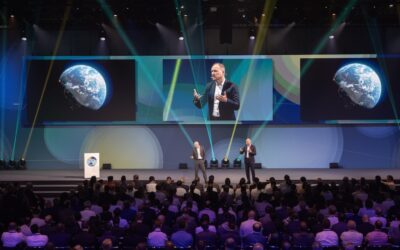Impact Digests | How can AI ensure food security for 10 billion people?

Last month, we held our second Impact Forum event, bringing together 5 experts to explore how we can use AI to ensure food security for 10 billion people – in just 60 minutes. Topics spanned from leveraging satellite imagery to cellular analysis to data-driven decision-making. Read on to explore some of the event’s key insights.
Key Takeaways
- Collaboration counts: Success in agricultural technology relies on collaboration between tech providers, researchers, and farmers.
- Empowering farmers: Educating and empowering farmers to use AI tools effectively is crucial for adoption.
- Innovation is essential: Continuous innovation in AI and tech is vital for addressing agricultural challenges and improving productivity.
Matthias Zwingli, Connect AI
Matthias Zwingli outlined key insights into the current landscape of AI and its impact on various industries, emphasising that AI doesn’t replace companies, but enhances the efficiency of those that use it.
He outlined the three use cases that he believes have the greatest potential to enhance food security through AI:
- improving crop yield and resistance by understanding and enhancing crop output
- precision farming to boost food production and conserve resources and
- industry-agnostic productivity improvements to improve efficiency and reduce time and resources needed.
Mateja Kramar, ETH AI Center
Mateja discussed the role of AI in securing food production from field to fork. She emphasised the importance of focusing on soil health and small-scale farmers, as they contribute significantly to global food production — 80% of the food we eat comes from small-scale farmers.
Mateja stressed the need to bring soil back to life through regenerative agriculture practices with the help of AI. She highlighted how AI can optimise farming practices, improve sustainability, and reduce food waste throughout the supply chain.
She outlined various AI applications, such as satellite imagery for monitoring farms and predicting harvests, and tracking food delivery to retailers to minimise waste. Mateja also stressed the need for consumer education and awareness to encourage healthier and more sustainable food choices.
Matthias Graeber, Bühler Group
Matthias discussed how AI can enhance sustainable food value chains by addressing various global crises, including climate change, mounting inequalities, and extreme biodiversity loss.
He highlighted Bühler’s role in providing machinery for food production and emphasised the importance of optimising to reduce its carbon footprint. Matthias presented examples of AI applications, such as machine control for scaling and optimisation of energy usage in drying processes.
Matthias demonstrated how reinforcement learning can optimise fan speed and thermal energy consumption, which leads to significant reductions in electricity and CO2 emissions. He also acknowledged that AI is not a standalone solution and emphasised the importance of a broader ecosystem approach and collaboration with partners like the Swiss Data Science Center.
Christopher Keim, Food Brewer & Patrick Albrecht, Fruitful AI
Christopher and Patrick discussed how their companies utilise AI to enhance food production and address global challenges in agriculture and manufacturing to ensure future food security.
Food Brewer specialises in plant cell culture technology to create edible products such as cocoa and coffee locally and sustainably. The company uses AI in media screening to optimise cell culture growth and select the best formulations for production.
Fruitful AI focuses on visual inspection systems powered by AI to assess the quality of agricultural products and manufacturing processes. Its technology aids in plant genotyping, quality control in bottling stations, and product inspection, ultimately improving efficiency and reducing operational expenses.
Integrating AI and agriculture for a sustainable future
The expert presentations were followed up by a Q&A session highlighting several key points about the integration of AI and technology in food production. Topics included:
- the role of farmers in the adoption and integration of AI in agriculture
- the need for collaboration and continued innovation among technology providers, researchers, and farmers.
- AI’s ability to provide verification and assurance for farmers in monitoring soil health and crop growth.
The integration of AI and technology in agriculture holds great promise for improving food security, sustainability, and efficiency in farming practices – but collaboration, education, and innovation are key to realising its full potential.
Thanks to everyone who joined us for the event! We’re already looking forward to our next Impact Forum event on 21st June on sustainable agriculture. Keep an eye out for more information coming soon!
Never miss a Swiss food innovation morsel.
Latest News
GoNina secures new funding from the Migros Pioneer Fund in its mission to reduce food waste
Swiss foodtech startup GoNina has...
Bühler Scale-Up Day accelerates industry and start-up collaboration
Valley partner Bühler is making...
What if talent – not tech – is the missing ingredient in building food system resilience?
What if talent – not tech – is the...
Bühler Networking Days 2025: Scaling sustainable food solutions through collaboration
More than 1,200 industry leaders from...




